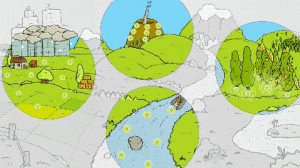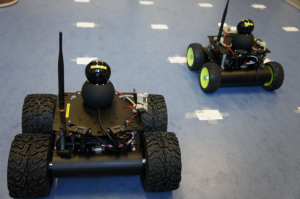Eric Fleury, FIT manager for the Inria part of the project and Inria DNET research team leader presents this new equipment, implying DNET, SOCRATE, PLANETE researchers and SED engineers.
What is FIT?
FIT (Future Internet of Things) is one of 52 winning projects of the French Ministry of Higher Education and Research’s « Équipement d’Excellence » (Equipex) research grant program. It is running over a nine-year period and the project will benefit from a 5.8 million euro grant.
FIT facility offers a means to experiment on mobile wireless communications at the network and application layers thereby accelerating the design of advanced networking technologies for the Future Internet. The road map is to open first services within FIT at the end of 2013.
Where is FIT located?
FIT equipment is distributed in several locations: Inria Grenoble, Inria Lille, Inria Rocquencourt, Inria Sophia, University Pierre and Marie Curie Paris and LSIIT, Strasbourg. Having several sites enables to experiment distributed applications and several in situ physical deployments.
Services offered by FIT
With several independent experimental testbeds FIT provides a larger-scale, more diverse and higher-performance platform for accomplishing advanced experiments.
Such federation of independent network experimental facilities is perhaps the only meaningful way to achieve the required scale and realism for supporting Future Internet research.
The project includes three types of tesbeds:
- five Embedded Communication Objects testbeds, forming large-scale infrastructure for testing the Future Internet of Things (SensLAB extended with more powerful nodes and flea of mobile nodes)
- three Wi-Fi mesh testbeds, offering highly flexible experimentation on a wide array of wireless networking issues
- a cognitive radio testbed, allowing experimenters to test ways of optimizing the use of radio frequencies for wireless applications
With such federated platforms, users will be able for example to test, design and deploy M2M application, with end to end IPV6 routing by reserving for a same experiment, sensor nodes, mobiles nodes and slices in the cloud.
How large is FIT?
The Embedded Communication Objects (ECO) testbeds will deploy 1024 nodes at the Inria Grenoble site, 656 in Inria Lille, 512 nodes in Inria Rocquencourt, 512 in Strasbourg and 128 nodes at Institut Mine Telecom.
Inria Grenoble is in charge of the design and development of all the hardware for the ECO testbed based on the success story of SensLAB.
The Wireless OneLAB testbed will deploy 50 wireless orbit nodes in Inria Sophia and 70 at UPMC.
The cognitive radio testbed will offer 10 fully equipped cognitive radio nodes with MIMO (multiple input multiple output) capability and 20 with only SISO (single input single output) capability.
The challenge ?
« FIT is a really challenging project embracing hardware design, deployment, software design, networking…thus gathering Inria’s skills and offering a real impact on our research. It allows to deploy large scale in situ experiments for the Future Internet of Things.
Network research domain will have a reliable scientific tool to go beyond models and simulations. »
E.F.




Commentaires récents